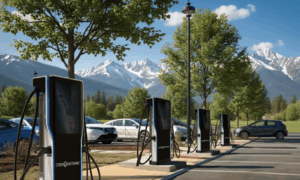
Home / EV Charging News / The role of charging station networks: Discusses the importance of reliable charging station networks to facilitate long-distance travel and uninterrupted charging
In recent years, the rise of electric vehicles (EVs) has brought about a pressing need for a robust charging infrastructure. Charging station networks play a crucial role in meeting this demand and ensuring the smooth functioning of electric vehicles. In this article, we will delve into the importance of reliable charging station networks in facilitating long-distance travel and uninterrupted charging for EV owners.
As more individuals embrace electric vehicles, the need for reliable charging options becomes increasingly evident. Charging station networks serve as the backbone of this infrastructure, offering convenient and accessible charging solutions for EV owners. These networks comprise strategically located charging stations that enable seamless long-distance travel and uninterrupted charging experiences.
One of the primary roles of charging station networks is to facilitate long-distance travel for electric vehicle owners. Range anxiety, the fear of running out of battery power while on the road, is a common concern among EV drivers. Reliable charging station networks help alleviate this anxiety by providing a network of charging stations strategically placed along highways and major routes.
With charging stations readily available, EV owners can confidently embark on long journeys, knowing they have access to charging infrastructure whenever needed. This accessibility ensures that drivers can travel significant distances without worrying about running out of battery power.
In addition to enabling long-distance travel, charging station networks also ensure uninterrupted charging experiences for electric vehicle owners. These networks offer a reliable and efficient means of charging, reducing the downtime associated with recharging electric vehicle batteries.
By strategically placing charging stations in key locations, such as shopping centers, parking lots, and urban areas, charging station networks provide convenient access to charging points for EV owners. This accessibility eliminates the need to rely solely on home charging options, particularly for individuals living in apartments or urban environments where home charging may be limited.
Moreover, charging station networks can incorporate fast-charging capabilities, allowing EV owners to quickly recharge their vehicles. Fast-charging stations significantly reduce the time required for charging, enhancing convenience and minimizing waiting times. This ensures that drivers can swiftly resume their journeys without significant delays.
Reliable charging station networks play a pivotal role in promoting the adoption of electric vehicles. The presence of a robust charging infrastructure addresses one of the key concerns potential buyers have – the ability to travel long distances without the fear of running out of battery power.
By providing a network of charging stations, EV owners are assured of the convenience and accessibility necessary for daily commutes and extended trips. This assurance helps alleviate any apprehensions about EV ownership and encourages more individuals to make the switch from traditional combustion engine vehicles to electric vehicles.
As the electric vehicle market continues to grow, charging station networks will evolve to meet the increasing demand. The future of charging infrastructure holds several exciting possibilities:
Reliable charging station networks play a vital role in supporting the growth and adoption of electric vehicles. By facilitating long-distance travel and providing uninterrupted charging experiences, these networks address the concerns and limitations associated with EV ownership. As technology advances and charging infrastructure expands, the future looks promising for electric mobility and a greener, more sustainable transportation system.



